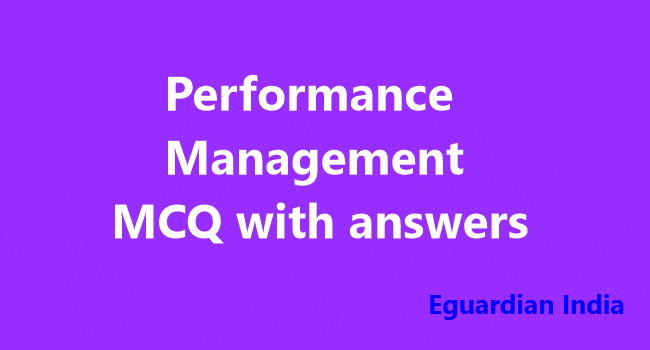In the modern corporate landscape, where organizations constantly strive for excellence, performance management has emerged as a crucial aspect of ensuring success. Performance management encompasses a range of practices and strategies to improve employee performance, drive organizational growth, and achieve strategic objectives.
Top 70 Performance Management Questions and Answers
1. Performance appraisal can be defined as the systematic evaluation of individuals’ performance on the job and their ___ for ___. (True/False)
Answer: Potential, development
2. PA can be seen from at least ___ different dimensions. (True/False)
Answer: five
3. Since different managers do PA, it needs to give more insight into employees’ contributions. It hence needs to enable categorising employees according to their organisational value. (True/False)
Answer: False
4. PA gives insight into how we create a job description, publicise jobs, and select and induct. (True/False)
Answer: True
5. PA creates a perverse competitive environment, which is often unhealthy. (True/False)
Answer: True
6. Despite the arguments against PA, it is necessary for administrative decisions, eliciting desired behaviour, enabling individual growth and personnel development, incorporating human resource planning with the total human resource system and for ___.
Answer: Fulfilling the legal requirements
7. McGregor (1957), in his classic piece titled “An Uneasy Look at Performance Appraisal”, has identified ___ essential functions/ needs of the performance appraisal.
Answer: Three
8. PA has an evaluative role, communicative role and ___ role.
Answer: Short and long-term developmental
9. Lack of training of ___ can be a significant problem in PA.
Answer: Appraisers
10. Performance appraisal is a data generation system for ___ conceptualisation and implementation.
Answer: Strategy
11. Performance appraisal acts as an ___ device for the human resource system.
Answer: Integrating
12. Filling the ___ form is the starting point of PA.
Answer: Self-appraisal
13. Joint evaluation is the most essential yet hated part of the PA process. (True / False)
Answer: True
14. Rebuttal is essential to meet the ends of ___.
Answer: Justice
15. One of the pitfalls of the HR department in PA is under-training managers in the process. (True/ False)
Answer: True
16. HR departments often tend to believe that ___ based appraisal will serve as protection against challenges by employees.
Answer: Ratings
17. HR departments sometimes tend to play the appraisal ___.
Answer: Cop
18. ___ involves the comparison between two individuals.
Answer: Paired comparison
19. the employees must understand that the manager and they share similar ___ and ___.
Answer: Goals and concerns
20. The PM planning details are always recorded in the document. (True/False)
Answer: True
21. You can segregate the end-cycle PM evaluation and the PM planning though it may lead to a need for more flow. (True/False)
Answer: True
22. In the graphic rating scale, various employees’ performance is given graphically to get an overall picture of the sub-unit or team. (True/False)
Answer: False
23. Critical incidents method describes how the employee demonstrated behaviour. (True/False)
Answer: True
24. Forced distribution method is ideal for small teams and units. (True/False)
Answer: False
25. It is necessary to set objectives before starting project work. (True/False)
Answer: True
26. Fact-finding exercise can be part of ___.
Answer: Assessment centre
27. 360-degree appraisal method involves three levels -employee, supervisor and subordinate. (True/False)
Answer: False
28. Potential appraisal presupposes that performance appraisal is of the past and hence not holistic. (True/False)
Answer: True
29. ___ are measuring scales in which the scale points to definite and indefinite behaviours.
Answer: BARS
30. Customer feedback is an essential component of the performance appraisal of employees. (True/ False)
Answer: False
31. ACR refers to ___.
Answer: Annual confidential report
32. PAR refers to ___.
Answer: Performance appraisal report
33. There are three feedback types: positive, negative and ___.
Answer: Abusive
34. Most organisations have performance feedback once a year, which is considered sufficient. (True/False)
Answer: False
35. Performance appraisals are most effective based on a single evaluator’s feedback. (True/False)
Answer: False
36. A performance appraisal must include specific information about the evaluated individual. (True/False)
Answer: True
37. Formal performance reviews should only have substantially new things discussed earlier. (True/False)
Answer: True
38. Making performance feedback meaningful to the individual and the organisation should be the ultimate objective to improve in this area. (True/False)
Answer: True
39. There are ___ components in good feedback.
Answer: four
40. While giving negative feedback, give the other person an opportunity to ___.
Answer: Respond
41. The person giving feedback should offer ___ suggestions, which the person taking feedback can use.
Answer: Specific
42. The ___ systems provide individuals with feedback from various organisational levels.
Answer: Multisource
43. ___ feedback makes a person singularly responsible for his performance improvement.
Answer: Self-directed
45. If there are fewer than 10 subordinates, a feedback report should not be provided to the supervisor. (True/False)
Answer: False
45. Stakeholders are people who are affected by an individual’s ___.
Answer: Performance
46. Annual assessment allows managing and monitoring of ___.
Answer: Values
47. A 360-degree feedback process is only as effective as the ___ that make up the survey.
Answer: Items
48. People give honest feedback only when there is a ___ in doing so.
Answer: Benefit
49. Peer rating is an excellent indicator of ___ performance.
Answer: Future
50. Peer input can be effectively used for determining ___ and ___.
Answer: Awards, recognition
51. One of the main reasons for the unsuccessful implementation of a 360-degree feedback process is the need for a clear purpose. (True/False)
Answer: True
52. Multi-rater feedback can be a good substitute for managing a poor performer. (True/False)
Answer: False
53. It is unnecessary to involve the key stakeholders in designing and implementing a 360-degree appraisal process. (True/False)
Answer: False
54. Complete communication is of no importance with 360-degree feedback. (True/False)
Answer: False
55. The pillars of a learning organisation are organisation, ___, knowledge and ___.
Answer: People, technology
56. While designing a PM in knowledge organisations, there has to be equal emphasis on individual and ___ performance.
Answer: Team
57. Within the learning organisation, there is an informal organisational structure without formal boundaries, making ___ more complex.
Answer: Performance management
58. There are ___ types of virtual teams.
Answer: Six
59. ___ and ___ are two significant challenges while managing the performance of a virtual team.
Answer: Fairness, equity
60. Virtual teams require a higher degree of ___ trust among their members and leaders.
Answer: Trust
61. The line managers are crucial in implementing performance management because they are___ for the task achievement, and HR is only a facilitator.
Answer: Responsible
62. One of the essential ways to address under-performance is effective ___ between managers and staff.
Answer: Working relationship
63. Line managers shy away from giving poor performance feedback because they fear the employee’s negative feelings may affect ___.
Answer: Production
64. Professor Yasser and Dr Wasi, who were great supporters of performance pay, believed that ___ was the main incentive for increased productivity.
Answer: Money
65. Research evidence suggests that performance pay is adequate only when the work is pure___.
Answer: Mechanical
66. Lower rate of labour always leads to lower labour costs. (True/False)
Answer: False
67. Sub-categories of hygiene factors include 1) working conditions, 2) the level and the quality of supervision, 3) the company policy and administration, 4) interpersonal relations, 5) job security, and 6) salary. (True/False)
Answer: True
68. ‘Expectancy’ means the employee believes the reward is desirable or valued. (True/False)
Answer: False
69. Linking ___ to performance is the most basic way of linking performance to reward.
Answer: Pay band
70. When we say that ‘your salary will increase by one increment if your performance meets expectation and by two increments if it exceeds expectation’, we assume that the employee values this. It can be explained by the term ___.
Answer: Valence




